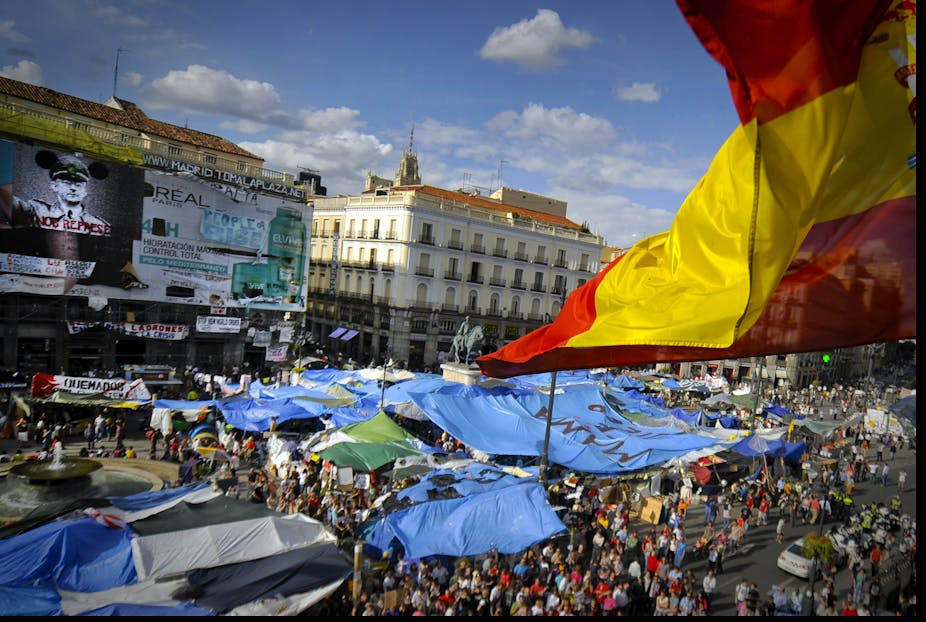On 15 May 2011, one week before Spanish regional and municipal elections, young people gathered on Madrid’s Puerta del Sol square to start a protest known as 15-M movement.
It has since acquired a universal meaning, both locally by reaching out to people from various social groups, and worldwide, by gathering support in other cities in Europe and in Latin America.
Interestingly, it is sometimes referred to as a new Spanish Revolution by the media and by the protesters themselves in a flurry of creative posters, even comparing it to the Bastille.

Yet the storming of the Bastille has always been a symbol of the destruction and fall of the old system, with a new economic, social and political era growing on its ruins.
Sol, on the other hand, symbolizes a need to change and repair our existing world; as a starting point, it demands a more participatory democracy.
It appears to be a protest against the current bipartisan political system, not an anti-system protest, and is conducted in a peaceful atmosphere, rejecting all forms of violence.
Logrono
A 60-year old participant in Logrono, who came to the demonstrations on 27 May with her husband and daughter, believes that the essence of the protest is not to reject altogether a system based on political parties and elections. But rather she wants to voice disapproval against problems within the structure of the current system. “The youth do not connect with the agendas of the current political parties”, she explained, and do not consider themselves properly represented by the current political system.
This was confirmed by David, a young leader of the occupants of the main square in Zaragoza, who is fighting not against the state, but to reclaim the state for the people.
According to the published manifestos and the multitude of posters glued onto every surface available in the vicinity of the gatherings, the participants are protesting also against economic inequality, social polarization, growing differences between the rich and the poor, and lack of jobs.
This is especially relevant for the young generation, both for those with a higher education who are becoming gradually more aware of their power and role in society, and the working class youth crippled by unemployment.
Zaragoza

“We want a dignified life”, said 20-year old Javi, one of the protesters in Zaragoza on 25 May. “I don’t want to be here, I would prefer to be at work”. But he doesn’t have a job or any prospects of getting one, with youth unemployment in Spain at an all-time high of 42%.
David believes that “change is possible, there is no doubt”. He sees his role as a representative of “generation 2000” as that of “breaking with history and creating something new.”
This view was reflected in some innovative posters pointing out to the need to replace a system that is broken by one that works.
The face of outrage

While observing the demonstrations across Spain, I couldn’t help but notice, and be impressed by, the presence of people of all ages: young couples with small children, middle aged people of all walks of life, as well as older people, all joined the ranks of the “outraged” (after Stéphane Hessel’s pamphlet).
It seems that this movement has transcended generational, economic and ideological divisions, most likely, in my opinion, thanks to its pacifist principles.
It is operating out of a need for reform that the whole of the society can understand and identify with.
That need is not yet matched by a uniform proposal on how to proceed, but intensive discussions and negotiations are taking place on all main squares across the country as well as in cyberspace, in the true spirit of participatory democracy that the protesters are fighting for.
The latest public opinion poll published on 4 June 2011 indicates that 64.1% of Spaniards agree with the demands of the 15-M movement.
It is very encouraging to see such peaceful approach (evolutionary rather than revolutionary) of the new generation to reform the current system into one that would be friendly to the whole of the society and each individual in their own right.
If the movement succeeds at elaborating an agenda of feasible reforms, it could lead to new structural solutions for contemporary western European democracies.

